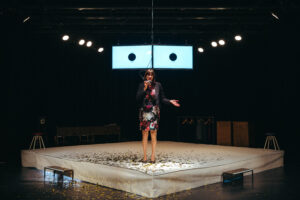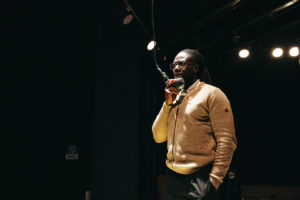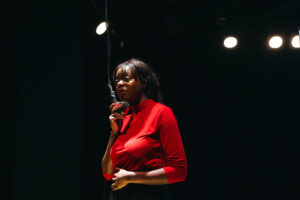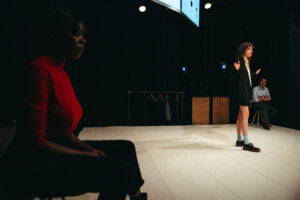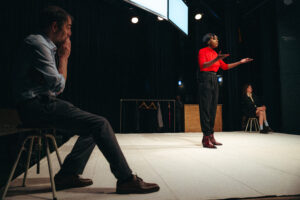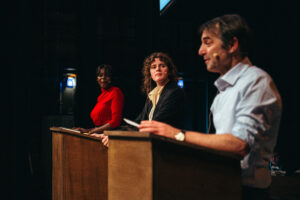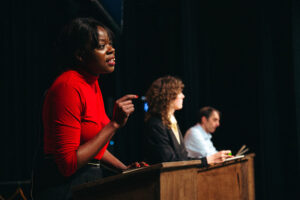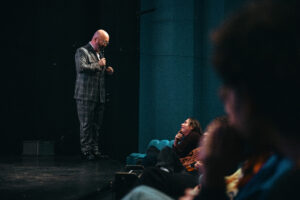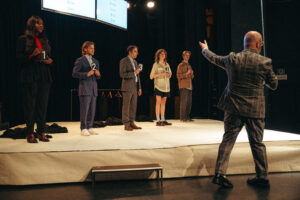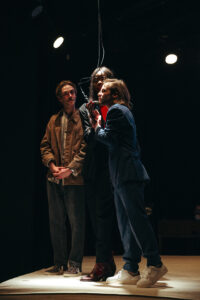A LIVELY AND TIMELY EXAMINATION
OF VOTING BEHAVIOR
Fight Night, brought to seven American states by the Belgian performance group Ontroerend Goed (a punning name, roughly translated as “Feel Estate”), combines theater of the absurd with current events to engage and challenge. Directed by Alexander Devriendt, brings five candidates (Aurelie Lannoy, Julia Ghysels, Bastiaan Vandendriessche, Michael Pas, and Prince K. Appiah) and a debate moderator (Angelo Tussens) to the stage, but they are far from the only performers. Two of these candidates are women; three are men. One woman and one man are Black; the rest are white. They are dressed more or less like candidates in fairly conservative “business casual” attire; only moderator Tussens, in his plaid double-breasted suit, might attract attention for his clothing (costumes by Valerie Le Roy). The set consists only of a black-box stage with a slightly raised speakers’ platform and two men toward the back of the stage operating laptops. Four large screens hang above the stage, easily visible to the audience.
I knew this performance would involve audience participation, but I expected something like What the Constitution Means to Me, in which audience members have a chance to weigh in at the end of the performance on how they view the U.S. Constitution. But in this show, people are handed lanyards with electronic clickers as they enter the theater (Samir Veen and Nick Mattan, voting system). Tussens comes out onto the stage first and paraphrases Mark Antony’s speech from Julius Caesar as he asks us to lend him our ears. For those who remember high school English, this should be a warning sign’”Antony effectively used that speech to manipulate a crowd.
Tussens proceeds to offer some test questions regarding basic demographics of gender, age, and income), presumably to give us some experience in using our electronic devices. We learn that at this particular performance, 58 percent of the audience is female and that 38 percent of those present are between 25 and 44 while 21 percent are between 45 and 60.
Then the five candidates come out onto the stage holding placards with numbers. Based on nothing but their appearance, the audience is given one minute to select its favorite. (Long-time residents of Massachusetts might find themselves superimposing local figures onto these candidates’”Michael Dukakis, Deval Patrick, William Weld, Ayanna Pressley, and Elizabeth Warren might all have had their counterparts on that stage last night’”superficially at least.) The results of that first low-information vote are projected onto the screen, and now the performance shifts into high gear.
Each candidate has the opportunity to introduce themselves, offering their name and a brief statement. The “winner” of the first round, with 36 percent of the vote, is Julia, the Black woman. When she introduces herself, she says, “This is my voice. I hope you like my voice as much as you like my face.” The loser of that first round, with only 8 percent of the vote, is Michael, the shorter of the two white men. “Let me win you over,” he says.
Every iteration of the performance is said to vary. Obviously, who the audience chooses as winners and losers cannot be predetermined, and the statements of the candidates in response to those outcomes must vary as well. What we cannot know on this particular night is that Michael will win the audience over by the end of the evening, and in ways that are disturbing and would frankly be quite frightening were they occurring outside the theatrical venue. In short, he convinces a sizeable portion of those in attendance to relinquish their ability to vote and trust him with their future.
How this outcome unfolds is endlessly fascinating. The audience appears to have agency’”after all, we are the ones with the clickers in our hands. And yet, as the performance progresses, our choices continue to narrow. We are not consulted regarding the criteria or the process for these diminishing choices, and it is only after the votes have been cast that we fully understand the implications of what we have chosen. By then, it seems that we have no power to reverse the process. Initial loser Michael’s ability to recognize and exploit this growing sense of frustration is what gives him the power to disrupt and ultimately destroy the mechanisms of democracy.
My only complaint about this fascinating evening is that it was performed in Boston for only two nights.
photos by Michiel Devijver M
Fight Night
Ontroerend Goed Theatre Performance Company
reviewed at Emerson Paramount Center in Boston MA, on September 21, 2024
tour continues: for more dates, visit Ontroerend Goed

